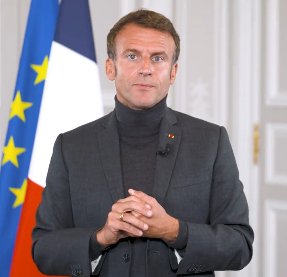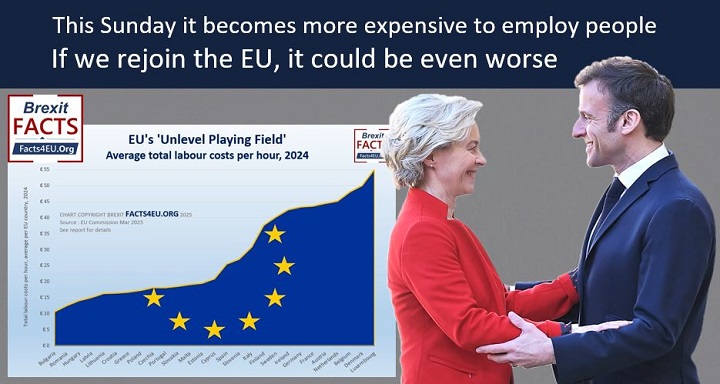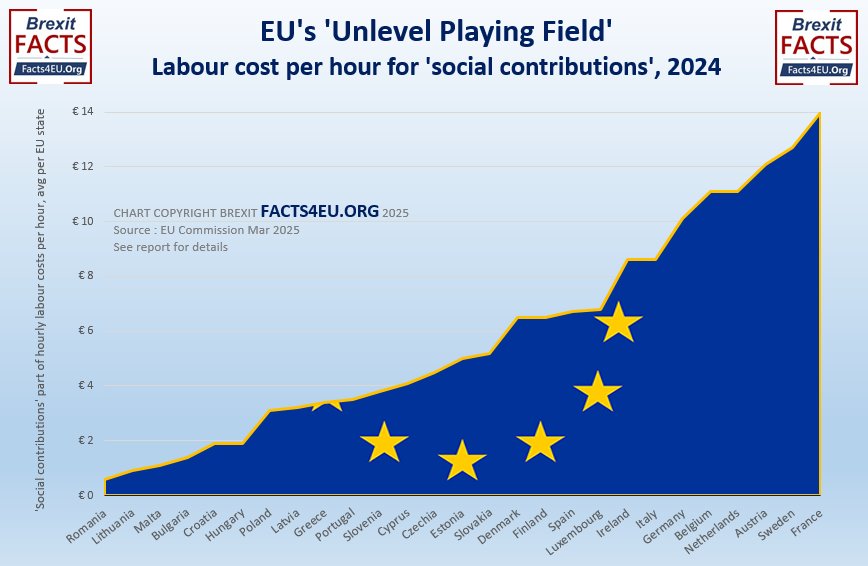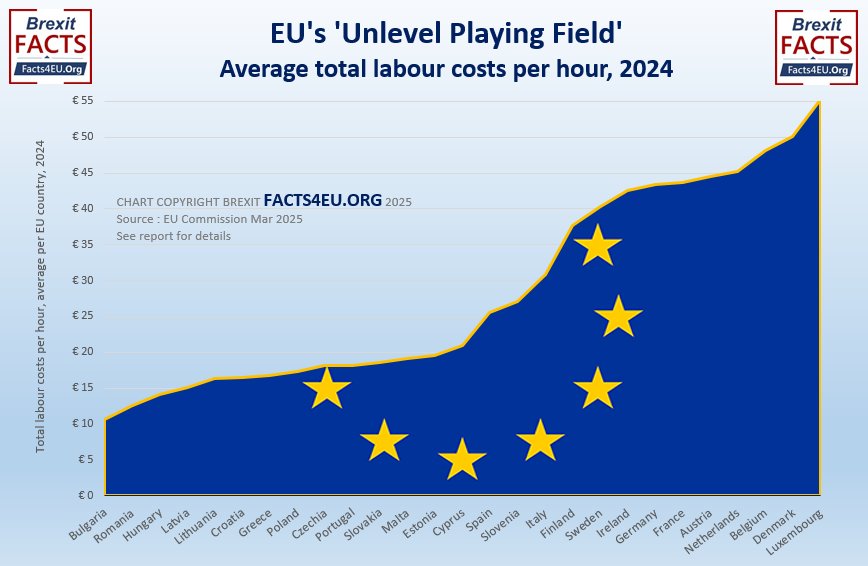This Sunday it becomes more expensive to employ people, what about in the EU?
If we rejoin the EU it could be even worse – latest EU data on Friday is not pretty
Montage © Facts4EU.Org 2024
As usual, the facts raise questions about why anyone wants to rejoin such persistent EU hypocrisy
On Sunday, Labour’s new tax regime for employing a person in the UK means employers will be facing an increase in the National Insurance Contributions (NICs) they pay on the wages of each person. This may be a decision deplored by all those who wish see far better economic growth than the UK is now experiencing, but at least it is a decision that can be made by the elected government of the people.
In the EU the trend has been firmly in the direction of harmonising such measures. Whilst this has not yet been achieved in the EU equivalent of National Insurance, it is clear this is the direction of travel. The evidence for this is in the Withdrawal Agreement which the EU imposed on the UK on its effective departure from the bloc on 31 December 2020, at the end of the ‘Transition Period’. In the course of the negotiations the EU tried to insist the UK could not diverge from its so-called ‘Level Playing Field’ – particularly in the area of employment.
The position on labour costs in the EU
The latest figures released on Friday afternoon (28 Mar 2025) by the EU Commission’s official statistics agency show the cost of employment across all 27 member countries. Not only do they show the huge disparity in average hourly wages between these member countries, they also reveal the extra labour cost per hour after stripping out the wages element.
The most expensive country for employment is President Macron’s France, whose non-wage labour costs per hour are 23 times higher than those of the least expensive, Romania. This reflects the amount of ‘social provision’ in each country.
Despite these bald facts, when negotiating with the UK on its withdrawal, the EU tried to insist that the UK had to match the EU’s standards, to ensure ‘a level playing field’.
Below we show just how steep an angle that ‘level playing field’ is pitched at.

Reminder of EU’s vitriolic negotiations with UK and EU's famous, illusory ‘level playing field’
At the beginning of the UK withdrawal process the EU set out with negotiating demands so absurd they were hard to tell apart from the demands of full EU membership which the UK was supposed to be leaving.
The EU’s insistence on the UK maintaining a ‘level playing field’ involved areas such as labour and social standards, competition and trade, state subsidies, nationalised industries, tax policy, environmental measures, and of course climate change.
Much of the talk was around the subject of ‘dynamic alignment’, which essentially meant keeping in lock-step. As a result of the EU’s stances, the compromise agreement - when eventually reached - favoured the EU. Certainly there is no remotely similar international agreement anywhere else in the World.
Remember the ‘level playing field’ pushed on the UK? The EU27 still can’t play on it themselves
Friday’s news – on the fundamental ‘playing field’ of labour costs – proved yet again that the EU cannot even maintain a level playing field on this core component of a business’s cost-base. We looked first at the total of those elements of the average labour cost per hour after stripping out the wage paid to the employee
Brexit Facts4EU.Org Summary
1. The labour costs per hour excluding the wage part, 2024
This part is referred to as ‘net social contributions’ and includes employers' actual social contributions, households' actual social contributions, imputed social contributions and households' social contribution supplements. Social insurance scheme service charges are deducted from the items above to reach net social contributions.
- France
- Sweden
- Austria
- Belgium
- Netherlands
- Germany
- Ireland
- Italy
- Luxembourg
- Spain
- Denmark
- Finland
- Slovakia
- Estonia
€ 14.0
€ 12.7
€ 12.1
€ 11.1
€ 11.1
€ 10.1
€ 8.6
€ 8.6
€ 6.8
€ 6.7
€ 6.5
€ 6.5
€ 5.2
€ 5.0
- Czechia
- Cyprus
- Slovenia
- Portugal
- Greece
- Latvia
- Poland
- Croatia
- Hungary
- Bulgaria
- Malta
- Lithuania
- Romania
€ 4.5
€ 4.1
€ 3.8
€ 3.5
€ 3.4
€ 3.2
€ 3.1
€ 1.9
€ 1.9
€ 1.4
€ 1.1
€ 0.9
€ 0.6
© Brexit Facts4EU.Org 2025 - click to enlarge
[Source : EU Commission’s official statistics agency, Eurostat, Mar 2025.]
France is costliest for the part of labour cost which never reaches the employee
Here, the disparity between the averages for different EU countries leaves the realms of ‘gaping divide’ (see the section on total labour costs per hour below) and stretches into a ‘yawning chasm’. To reiterate, this is the part of overall labour costs per hour which is the non-wage element.
This part costs a scarcely credible 23 times more in France (€14.00/hr) than it does in Romania (€0.60/hr). This very clearly shows up what is always said about France. Its economy is burdened with excessive payments for its bloated social state, which goes some way to explaining why France – the No.2 economy in the EU - is in increasing difficulties with its current deficit and therefore with the financial markets.
The EU’s playing field is still at such a steep angle some of the EU27 might fall off the end
Brexit Facts4EU.Org Summary
2. Average total labour costs per hour of EU27 countries, 2024
The data below shows the total labour cost per hour, including both the wage part and the net social contributions part.
- Luxembourg
- Denmark
- Belgium
- Netherlands
- Austria
- France
- Germany
- Ireland
- Sweden
- Finland
- Italy
- Slovenia
- Spain
- Cyprus
€ 55.2
€ 50.1
€ 48.2
€ 45.2
€ 44.5
€ 43.7
€ 43.4
€ 42.5
€ 40.3
€ 37.7
€ 30.9
€ 27.1
€ 25.5
€ 21.0
- Estonia
- Malta
- Slovakia
- Czechia
- Portugal
- Poland
- Greece
- Croatia
- Lithuania
- Latvia
- Hungary
- Romania
- Bulgaria
€ 19.6
€ 19.1
€ 18.5
€ 18.2
€ 18.2
€ 17.3
€ 16.7
€ 16.5
€ 16.3
€ 15.1
€ 14.1
€ 12.5
€ 10.6
© Brexit Facts4EU.Org 2025 - click to enlarge
[Source : EU Commission’s official statistics agency, Eurostat, Mar 2025.]
Overall on average, it costs over five times as much to employ the average worker in Luxembourg than in Bulgaria
As the EU itself says, “The average hourly labour costs mask significant gaps between EU countries.” With the cost in Luxembourg 5.2 times as much as in Bulgaria, the ‘gap’ might be described as a gaping divide rather than as ‘significant’.
Taking the EU27 overall, as one entity, the average total hourly labour cost works out at €31.80 per hour. That said, given the massive disparities between the 27 EU countries, an average is meaningless. It is obvious at a glance that when it comes to ‘labour and social standards’, the EU has no such thing as a ‘level playing field’.
And visibly Emperor Macron can be said to be wearing no clothes.
Observations
Our report today shines another bright light on the hostile intent of the EU Commission towards the United Kingdom - the country which rejected its fictional charms.
These figures provide another example of how the ‘level playing field’ which the EU insisted the UK should accept on its departure from the dysfunctional bloc was a fantasy then…. and remains so to this day.
Quite why the British negotiators didn’t laugh their opponents from the Commission out of the room when they raised ‘the level playing field’ can only be explained by the fact that they were, at that time, Remainers to a man and woman. This can be the only explanation because there simply is no such thing as any standardisation of employment rules in the EU, except in some clearly defined areas. Rejoiners cannot pounce on this last caveat to say we are fearmongering, because it is the EU itself that insists on the existence of the level playing field.
In the EU, there is only one way of travel and that is to the centre. The eurocrats will not be satisfied until everything is decided from Mission Control: the Berlaymont building in Brussels’ EU quarter.
Returning to the subject of Rachel Reeves’ increase in employers’ national insurance contributions and in the minimum wage, these may be heinous errors in the minds of many, but at least they are our heinous errors. AND they can be rectified by the UK Government changing its mind…. or by the British electorate changing its government.
Please, please help us to carry on our vital work in defence of independence, sovereignty, democracy and freedom by donating today. Thank you.
[ Sources: EU Commission official statistics agency, Eurostat ] Politicians and journalists can contact us for details, as ever.
Brexit Facts4EU.Org, Mon 31 Mar 2025
Click here to go to our news headlines
Please scroll down to COMMENT on the above article.
And don't forget actually to post your message after you have previewed it!
Since before the EU Referendum, Brexit Facts4EU.Org
has been the most prolific researcher and publisher of Brexit facts in the world.
Supported by MPs, MEPs, & other groups, our work has impact.
We think facts matter. Please donate today, so that we can continue to ensure a clean Brexit is finally delivered.
Paypal Users Only - Choose amount first
Quick One-off
Monthly







Something to say about this? Scroll down for reader comments